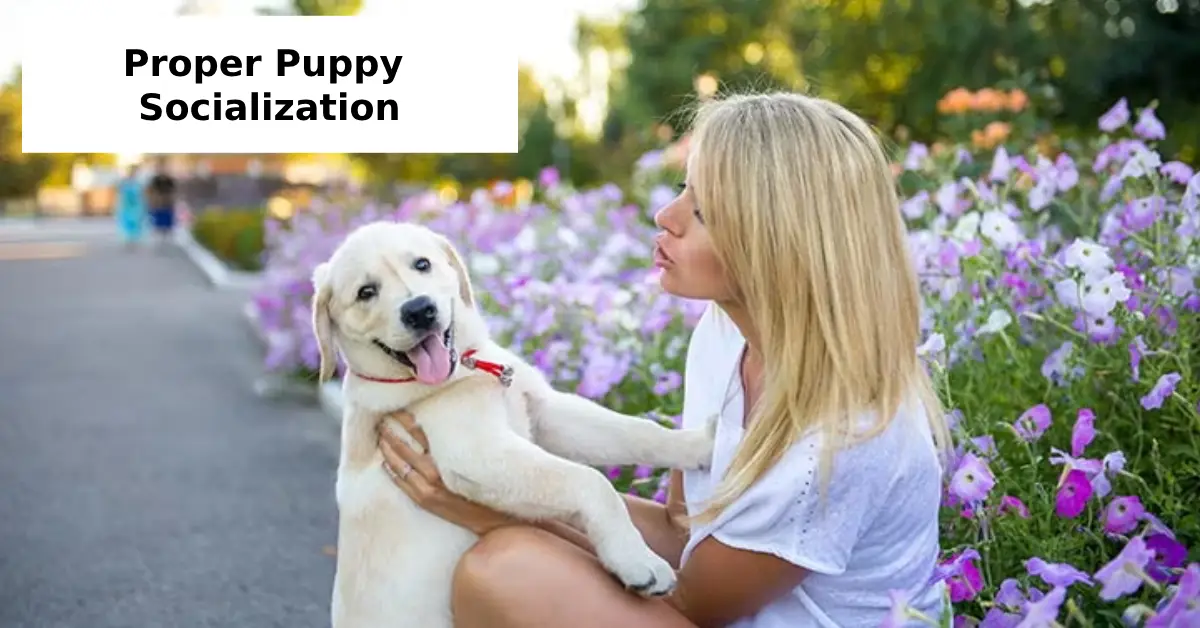Bringing home a puppy is a joyful and life-changing experience, especially for first-time pet parents or families adopting puppies. However, raising a well-mannered, confident dog starts with one crucial step—Proper Puppy Socialization.
This process helps your puppy adjust to the world, preventing anxiety, aggression, and fear in the long run. Whether you’re a new dog owner, a pet care professional in the U.S., or someone running a veterinary clinic, understanding the long-term benefits of proper puppy socialization is essential for fostering a well-rounded canine companion.
What Is Proper Puppy Socialization?
Proper puppy socialization means gradually introducing your pup to various people, environments, animals, sounds, and situations during their early development stages. According to most dog trainers and behaviorists, this period is critical in shaping your dog’s lifelong behavior and emotional resilience.
Why Proper Puppy Socialization Matters
Let’s dive into some of the most important long-term benefits of proper puppy socialization:
1. Reduces Fear and Anxiety
Puppies who are not properly socialized often grow up to fear unfamiliar people, loud noises, or new situations. This can result in chronic anxiety and unwanted behaviors. Early exposure during the puppy socialization timeline helps dogs react calmly in different environments.
A properly socialized pup is less likely to develop separation anxiety, a common issue among many adult dogs. Learn how a well-trained dog can overcome separation anxiety through proactive early interaction and confidence-building exercises.
2. Encourages Friendly Behavior
Socializing your puppy with other animals, especially socializing puppies with other dogs, leads to better interaction at dog parks, vet clinics, and grooming salons. Friendly behavior reduces the chances of aggression or fear-based responses in adulthood.
This benefit is especially valuable for rescue and shelter adopters who may not know the dog’s full history. Introducing consistent socialization from the start sets a foundation for friendly and manageable behavior.
Understanding the Puppy Socialization Timeline
Knowing when to socialize a puppy is vital. Experts recommend starting between 3 to 14 weeks of age. This is when puppies are most receptive to new experiences. Missing this window can result in behavioral challenges later in life.
If you’re unsure, consult your veterinary clinic to ensure your pup is healthy and ready for safe exposure. Starting puppy training early can be done with structured puppy obedience training USA programs or puppy socialization classes near me in your area.
Long-Term Health and Emotional Benefits
3. Builds Confidence in New Situations
A well-socialized puppy becomes an adult dog that handles crowds, travel, and new environments with ease. This is particularly important for pet bloggers and influencers who often feature their pets in public settings or events.
Consistent exposure to various people, places, and experiences helps dogs feel secure, confident, and less likely to panic.
4. Easier Vet and Grooming Visits
Dogs that have been introduced to different handling methods early on are easier to manage during grooming and veterinary procedures. This benefits both the dog and the pet care professionals in the U.S., reducing stress for all involved.
How to Start Proper Puppy Socialization
5. Use Early Puppy Training Tips
Start with simple early puppy training tips like handling their paws, ears, and mouth. Introduce them to household items like vacuum cleaners or doorbells. Expose them to different surfaces like grass, tile, or wood.
Use treats and positive reinforcement to make each experience enjoyable. Socialization should always be a positive and safe experience.
6. Enroll in Puppy Classes
Puppy socialization classes near me offer structured settings where pups can meet other dogs and people. These classes also focus on puppy behavior training, helping your dog develop impulse control and responsiveness.
Make sure to choose certified trainers who understand the principles of proper puppy socialization and use humane, reward-based methods.
How to Socialize a Shy Puppy
Some puppies may be naturally reserved or nervous. Learning how to socialize a shy puppy involves patience, consistency, and empathy.
Take it slow—let your puppy observe from a distance and reward calm behavior. Gradually increase exposure as your pup gains confidence. Never force interaction; allow your dog to approach at their own pace.
The Best Age to Socialize a Puppy
The best age to socialize a puppy is between 3 and 14 weeks, often called the “critical socialization window.” However, it’s never too late to start. Even older puppies and adopted dogs can benefit from exposure and training, though the process may take longer.
If you’re unsure where to start, dog trainers and behaviorists can create a personalized plan tailored to your puppy’s age and temperament.
Real-Life Impact of Puppy Socialization
Many first-time pet parents notice dramatic differences between socialized and non-socialized puppies. Dogs that have undergone proper socialization tend to:
- React calmly to strangers
- Adapt quickly to changes
- Play well with other dogs
- Behave better during travel
- Exhibit lower stress levels
These behavioral improvements are not just good for your pet—they also enhance your quality of life as a dog owner.
Expert Tips for Long-Term Socialization
Proper puppy socialization doesn’t end after 14 weeks. It’s a lifelong commitment. Here are some additional expert tips:
- Continue introducing new environments monthly
- Arrange safe playdates with dogs of all sizes
- Invite friends over to create a “people variety”
- Let your dog explore new smells and textures
- Keep reinforcing good behavior through positive rewards
Remember: The more enriching your puppy’s experiences, the better equipped they are to face the world with confidence.
Addressing Common Concerns
Many new dog/puppy owners worry about exposing their puppies too early due to health risks. It’s important to strike a balance. According to the American Veterinary Society of Animal Behavior, the risk of behavioral issues from delayed socialization outweighs the minimal health risks if done responsibly.
Vaccinate your puppy appropriately and consult with your vet before engaging in public activities.
Conclusion
The long-term benefits of proper puppy socialization are undeniable. It shapes your dog’s behavior, improves their quality of life, and makes them easier to live with. Whether you’re a dog trainer, pet care professional, or simply a first-time dog owner, investing in early and consistent socialization pays off for years to come.
From reducing anxiety and building confidence to improving social skills and obedience, proper socialization is the cornerstone of a well-adjusted, happy, and healthy pet.
So don’t wait—start socializing your puppy today. Explore your options for puppy obedience training USA, enroll in puppy socialization classes near me, and help your furry friend become the best version of themselves.
Learn how your dog can overcome separation anxiety with effective strategies and early training routines.





